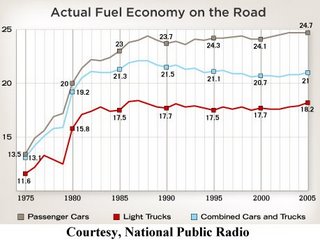 Our neighbor, blogger Bryan over at Why Now?, has been theorizing about the Air Force's announced plan to move the 46th Test Wing from Eglin Air Force Base to Edwards AFB in New Mexico. If the move happens, nearly 3,500 jobs will be eliminated directly and many times that number indirectly.
Our neighbor, blogger Bryan over at Why Now?, has been theorizing about the Air Force's announced plan to move the 46th Test Wing from Eglin Air Force Base to Edwards AFB in New Mexico. If the move happens, nearly 3,500 jobs will be eliminated directly and many times that number indirectly.That's a lot of jobs in this low-wage, high retirement area. The prospect has a lot of Florida Panhandlers upset -- starting with real estate interests who already are feeling the pinch of a stagnant housing market.
The potential move is being explained, according to the Ft. Walton Daily News, because of Edwards' advantage in having "the largest restricted airspace in the nation" and "no encroaching subdivisions."
Bryan reads that as meaning the Air Force doesn't like the idea of having oil rigs near its weapons ranges in the Gulf of Mexico. Six years ago, we were told by authoritative sources at the Naval Air Station that the Navy was deeply concerned about the high rises at Portofino, too. But when they were asked if they would take a public stand, the answer we got was "No, we'll just move our operations somewhere else."
Drilling rigs, high rise condos, and residential neighborhoods don't mix well with gunnery ranges -- any more than tar balls and beach water go together. It's a dark irony that Jeff Miller's oil rigs gamble may play a part in crippling the local economy by driving the 46th Test Wing away.
Bad as that would be, it's only one of a whole ocean of unintended consequences Miller's drilling rigs flip-flop could have for Northwest Florida. As Pensacola's Enid Siskin warned in her testimony before Miller's committee, "drilling, whether for oil or natural gas is a dirty, polluting business." She added --
"We cannot drill our way to energy independence. It’s only through conservation, increased efficiency, and use of a combination of alternative, renewable energy sources that we’ll ever be self sufficient."So, you may ask, what has Mr. Miller done to promote "conservation, increased efficiency, and alternative fuels"?
Not much, according to the League of Conservation Voters. Based on 18 key votes in the current session of Congress, Miller earned only a 17% rating (out of a possible 100) from this very mainstream organization. In FCAT terms that would be an F-minus.
Notably, one of his votes came in April when he voted against a "proposed... amendment to raise the ... CAFE [mileage] standard for cars and light trucks to 33 miles per gallon by 2016... [which] would have saved 1 million barrels of oil a day by 2016... ."
"America’s cars and light trucks consume 8 million barrels of oil every day — more than 40 percent of total U.S. oil consumption. Raising the miles-per-gallon of these vehicles is the biggest single step the U.S. could take to cut both oil dependence and global warming emissions.As the graph at the top of this article shows, in the last ten years average fuel efficiency of American vehicles actually has declined, thanks mostly to the proliferating Hummers and SUVs. But industry experts, as was pointed out yesterday on National Public Radio, say the technology to make even SUV-type vehicles far more fuel-efficient has been within reach for some time. All that's needed is a push from the government.
"Under current Corporate Average Fuel Economy (CAFE) standards, cars are required to meet a 27.5 miles per gallon standard. By contrast, light trucks, including sport utility vehicles (SUVs), minivans and pickup trucks, must meet a standard of only 21.6 miles per gallon. * * * But with more and more gas-guzzling SUVs and other light trucks replacing cars on the nation’s highways, the fuel economy of new vehicles has sunk to its lowest level since the early 1980s.
"During consideration of H.R. 6, the House energy bill, Representatives Sherwood Boehlert (R-NY) and Ed Markey (D-MA) proposed an amendment to raise the CAFE standard for cars and light trucks to 33 miles per gallon by 2016. If enacted, House Amendment 73 would have saved 1 million barrels of oil a day by 2016 — more than could be pumped from the Arctic National Wildlife Refuge at peak production — and would have prevented the annual release of 150 million tons of carbon dioxide into the atmosphere."
Such an easily reachable standard as Miller voted against conceivably could have saved the 46th Test Wing as well as the beaches of Northwest Florida. Instead, it appears he traded it away in favor of letting drilling rigs creep closer to the coast.







No comments:
Post a Comment